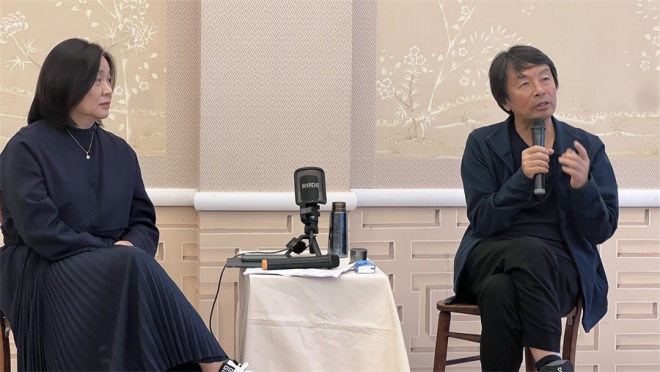
Chinese writers, Liu Zhenyun and Liang Hong, met readers in London’s Chinatown on Wednesday, following the recent publication of English versions of their works One day, Three autumns and The Sacred Clan in the UK.
Liu’s book One day, Three Autumns was first published in Chinese in 2021, and its English version was published by ACA Publishing Ltd this year. ACA focuses on translated versions of Chinese literature.
The book tells the life of people in Yanjin, Henan province, which is Liu’s real-life hometown.
People in the county are terrorized by a forsaken spirit called Hua Erniang, who has been waiting for her husband for 3,000 years. She will run into people’s dreams and demand a joke. If she was amused by the joke, she will give them a persimmon; if not, they will be crushed by her jilted heart which has calcified into a mountain. The book is found as humorous as Liu’s other works.
Humor has been a distinctive feature of Liu’s language and works, which are sometimes seen as hard to translate and be understood by readers in other cultures.
“Readers always say that they can see humor in my novels, but this kind of humor is actually the humor that grows out of the relationships between characters, rather than the humor in language. They should be easily translated and be understood by readers from different cultures and countries,” said Liu, who is one of China’s most well-known writers.
He has penned highly acclaimed works, including Someone to Talk To, Remembering 1942, and I Did Not Kill My Husband, and won Mao Dun Literature Prize in 2011 for his book Someone to Talk To. In 2018, he was awarded the Knight of the Order of Arts and Letters by France’s Ministry of Culture.
David Lammie, senior editor of Sinoist Books under ACA, agreed, saying that “situational humor, the characters and the difficult situations they get into, for example, black humor — these translate quite easily. What doesn’t translate easily is play on words, puns, little jokes in dialogue. That’s more difficult because having to explain a joke means the joke is no longer funny.”
“Within tragedy is comedy, within comedy is sorrow,” said Liu. “The humor, in essence, can be understood by different countries easily and quickly.”
Liu’s works have been translated into more than 20 languages including English, French and German.
“Without translations of these books, I might feel like a tourist in a foreign country. But with translated versions, readers feel familiar to you because of the characters in the books, you become closer to each other because of the common friends in the books,” Liu said.
“Literature is also the fastest and cheapest way for readers to get familiar with a country, its past, present and future,” he continued. “They can get the details about how Chinese people think, laugh and cry, and even the dust in their wrinkle.”
Liu also shared an encounter with a foreign reader. “I met a lady in Amsterdam, Netherlands. She said that the image she got from some Western media was that Chinese people had blank faces and were empty-headed. But after reading my book I Did Not Kill My Husband, she found out that the Chinese could be so humorous and even respectful.”
